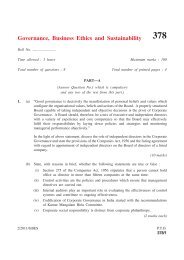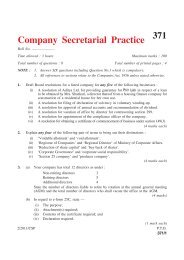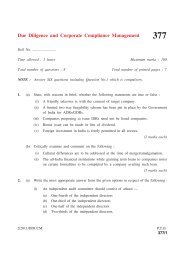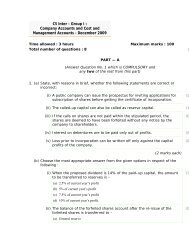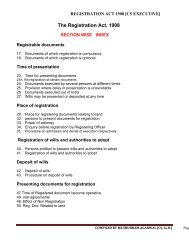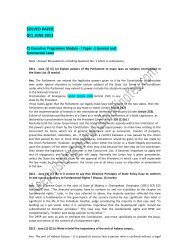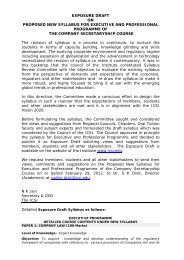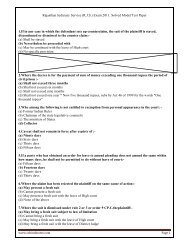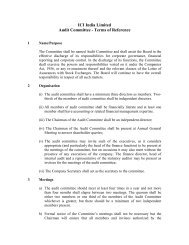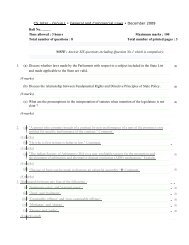CS EXECUTIVE SOLVED PAPER GCL GENERAL AND ... - cs notes
CS EXECUTIVE SOLVED PAPER GCL GENERAL AND ... - cs notes
CS EXECUTIVE SOLVED PAPER GCL GENERAL AND ... - cs notes
Create successful ePaper yourself
Turn your PDF publications into a flip-book with our unique Google optimized e-Paper software.
<strong>CS</strong> <strong>EXECUTIVE</strong> <strong>SOLVED</strong> <strong>PAPER</strong><br />
<strong>GCL</strong><br />
Electronic record means "data, recorded or data generated, image or sound stored, received or<br />
sent in an electronic form or microfilm or computer generated micro fiche". [Section 2(1 )(t)]<br />
2010 - Dec [4] (c) What are ‘cyber offences’ under the Information Technology Act, 2000 (5<br />
marks)<br />
Answer :<br />
Please Refer 2010 - June [2] (iii) on page no. 176<br />
Chapter - 8 : The Code of Civil Procedure, 1908 (C.P.C)<br />
2010 - Dec [3] Distinguish between the following :<br />
(iv) ‘Set-off’ and ‘counter-claim’.<br />
Answer :Please Refer 2008 - Dec [4] (ii) on page no. 187<br />
(4 marks)<br />
2010 - Dec [7] (c) Ram and Shyam sell rice for Rs. 25,000 to Sohan and Mohan. Sohan sells<br />
cloth worth Rs. 28,000 to Shyam. Sohan files a suit against Shyam for recovery of price of cloth.<br />
Shyam claims set-off of the cost of rice in this suit. Will he succeed (5 marks)<br />
Answer : ‘Set off’ means a settlement where both the plaintiff and the defendant have some claims<br />
to be collected from each other. What one party owes to another might be used to discharge all or a<br />
part of the debt he is owed by the other party.<br />
In the given case, Sohan is the plaintiff while Shyam is the defendant. The amount of which<br />
set-off is claimed by the defendant Shyam is not recoverable from Mohan, who is jointly liable<br />
with Sohan to pay it. Mohan is not party to this suit.<br />
In view of the factual situation, Shyam will not be allowed set-off of the amount claimed by him,<br />
as set off is allowed only against those parties which are jointly liable in the first place.<br />
Chapter - 9 : The Code of Criminal Procedure, 1973<br />
2010 - Dec [7] (a) A magistrate of the first class passed a sentence of imprisonment for a term<br />
of three years with a fine of Rs. 4,000 and in lieu of non-payment thereof an additional<br />
imprisonment for another one year. Has the aggrieved person any right to appeal against this<br />
sentence (6 marks)<br />
Answer :<br />
Section 29 of the Code of Criminal Procedure, 1973 specifies the sentencing powers of<br />
Magistrates. So far as the Magistrate of the first class is concerned, as per Section 29 of the<br />
Code, a Magistrate of the first class may pass a sentence of imprisonment for a term not<br />
exceeding three years or of a fine not exceeding five thousand rupees or of both.<br />
Section 30 of the Code specifies the limits of Magistrate's powers. It provides that the Court of<br />
a Magistrate may award such term of imprisonment in default of payment of fine as is authorised<br />
by law provided the that the term:<br />
(i) is not in excess of the powers of the Magistrate under Section 29; and<br />
Keep visiting www.<strong>cs</strong>hindi<strong>notes</strong>.com Page 10


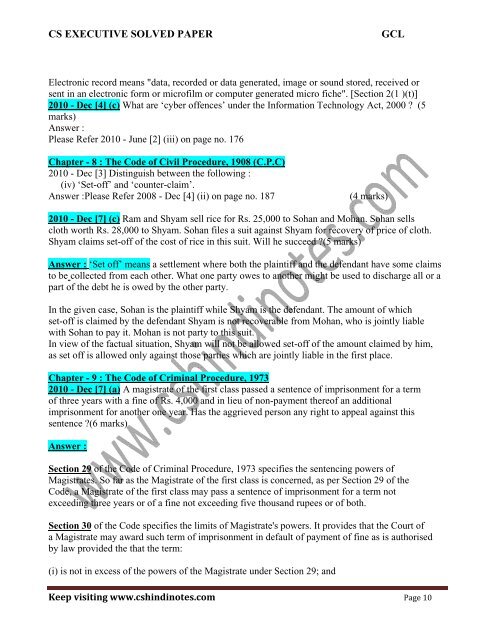
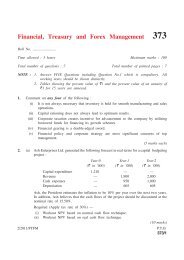

![vf/kfu;e dk vFkZ 'fu.kZ;' [ Interpretation of Statues ] Statue ... - cs notes](https://img.yumpu.com/38855798/1/190x245/vf-kfue-dk-vfkz-fukz-interpretation-of-statues-statue-cs-notes.jpg?quality=85)
